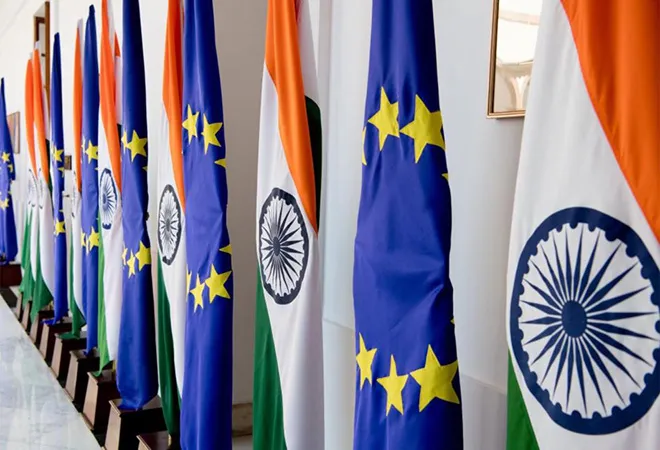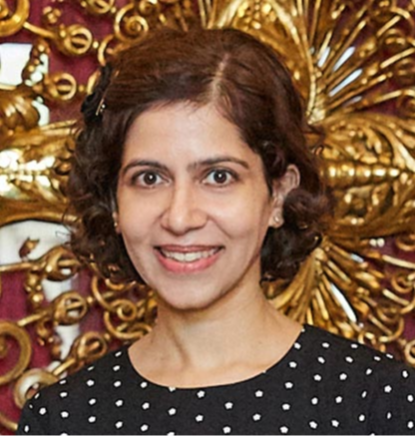
Yes, there was that cute hashtag of “#EUIndiaEkSaath” to accompany the EU-India 15th Summit yesterday. And yes, it doesn’t hurt to be social-media savvy in this day and age. But happily, there is also some substance to EU-India cooperation, as the Joint Declaration– surprisingly – shows.
Surprisingly, for three reasons. First, because usually such summits, for all the fanfare that leads up to them, often end up reiterating banalities on multilateralism, motherhood, and apple pie. And that’s on a good day; on other days, they fail to produce a joint statement at all. Second, because the EU itself has been so rife with division over key issues. Its handling of the early stages of the pandemic were far from stellar. Its own members have divergent positions on major geopolitical questions including threats posed by China or Russia. And third, also because far too often, blame games and finger-pointing between the EU and India – on issues such as labour standards and environmental standards – have stymied some potentially positive developments (such as the FTA negotiations that were put on the back-burner in 2013). But this time seems to be at least a little bit different. Below, some highlights on why this summit is a step in the right direction, and also the risks ahead.
Rediscovering each other as natural partners
First, there is the declaration of “shared principles and values of democracy, freedom, rule of law, and respect for human rights, aiming at delivering concrete benefits for the people in the EU and India.” And then there’s some more good stuff on the world’s largest democracies. Now none of this is new – previous declarations from the two have also included such references. But taken in a context when these values – which we took for granted for decades – now face an unprecedented threat, this attention to values acquires a powerful significance. Plus there’s attention to climate change mitigation, sustainable development, and inclusive growth i.e. goals that one would expect to make an appearance in such a declaration in normal times. But as these are not normal times, an acknowledgement of these crucial goals deserves more credit than usual.
Second, even as the US has stomped all over and out of the beleaguered World Health Organization (WHO), world leaders have tended to overcompensate by swinging in the opposite direction, declaring their undying love and loyalty for the organization. The EU-India joint declaration does not criticize the WHO either, but at least it does not issue it with a carte blanche of support. Paragraph 3 says, “The leaders emphasised the importance of strengthening our preparedness and response capacities, of sharing information in a free, transparent and prompt manner, and of improving international response including through relevant international organisations, such as the World Health Organisation (WHO), drawing on lessons learned from the current global responses.” That’s just a little rap on the knuckles in the grand scheme of things, but coming from the EU (and its multi-member character), that’s pretty punchy. And then, it gets better still.
Third, Paragraph 4 turns to the issue of cooperation in healthcare, including ensuring the affordability and accessibility of vaccines. And then it reveals that the leaders “underlined the importance of ramping up the manufacturing of vital medical supplies and of stepping up cooperation to ensure a continued flow of these supplies, agricultural products, raw materials and other goods and services across borders” (emphasis added). Admittedly, this is not a dramatic proclamation of plans to decouple from China. But take India’s geographic proximity to China and encirclement by the “String of Pearls”, and the EU’s own internal pro-China lobbies and divisions within the membership, and this is as tough as the two can publicly get on China at this stage. Expect a restructuring of supply chains that will bring these two like-minded players closer, and reduce their dependence on China.
Fourth, the declaration pays attention to digitalization. The leaders “agree to enhance convergence of their regulatory framework” (Paragraph 8). And they commit to engaging on 5G and Artificial Intelligence “including to promote global standards…” Remember the days – not so long ago – when “setting global standards” was assumed by a global north to be the moral preserve of the EU and the US? Clearly, we’ve come a long way.
Fifth, there are interesting references to security cooperation. Again, this is not the first time that we find this in an EU-India Joint Declaration, nor is the reference to the Indian Ocean a first. The Declaration last year, for instance, had referred to a commitment to “enhance maritime security cooperation in the Indian Ocean and beyond.” But this year, the language is stronger, and this matters especially in the context of India’s cooperative efforts as part of the Quad Initiative in the Indo-Pacific: “They underlined the need to preserve safety and stability in the Indian Ocean” (paragraph 10). The EU-India Action Plan 2025 offers further details on the substance of the military cooperation that is envisaged, as well as other aspects covered in the Declaration.
These two democracies seem to be getting their act together, speaking the language of being “natural” partners. This closeness undoubtedly stems from the desire of both parties to preserve and reform multilateralism, and lessen the human and economic suffering of their own peoples and globally that the pandemic has caused. But ironically, they probably also have China’s recent expansionist spree to thank for bringing them together. Chinese border disputes with India, territorial claims in the South China Sea, and even developments in Hong Kong may have seemed sufficiently far away to Europe. But the exploitation of global health chains by China as part of its coronavirus diplomacy, as well as growing concerns worldwide about Chinese investment in 5G and other critical technologies, have brought the threat posed by China’s rise much closer to home for Europe. Perhaps Europe finally sees where India has long been coming from.
The exploitation of global health chains by China as part of its coronavirus diplomacy, as well as growing concerns worldwide about Chinese investment in 5G and other critical technologies, have brought the threat posed by China’s rise much closer to home for Europe. Perhaps Europe finally sees where India has long been coming from
The course of true love never did run smooth: Challenges ahead
While this 15th Summit might have set EU-India cooperation on the right path, the challenges that these two players still face towards a deeper cooperation are several.
One peculiar bane of the EU-India relationship has been to fixate on trade issues, and then get deadlocked in a very narrow debate on labour and environmental standards. Commercial interests within Europe complain of the difficulties they face in doing business with India. Even after the quantum leaps that India has made in the Ease of Doing Business Index under Modi, the “efficiency” of a totalitarian state (and irrespective of its abysmal human rights record) seems to be more attractive to some business interests. India reacts with defensiveness, and its own market-oriented reform still leaves much room for improvement.
One peculiar bane of the EU-India relationship has been to fixate on trade issues, and then get deadlocked in a very narrow debate on labour and environmental standards. Commercial interests within Europe complain of the difficulties they face in doing business with India
Additionally, both sides have have long-cultivated habits of fence-sitting. India has a tough balancing act to manage, with China present at its borders, and so perhaps one can understand the mix of tough talk and sweet talk it brings in this context. In the case of the EU though, this habit is deeply ingrained, less justifiable, and change is slow. For instance, even as multiple players have in the last months have stepped up their criticism of Chinese “bullying”, the EU’s High Representative Josep Borrell remarkably stated even as recently as 10 June, “It is clear that China has a global ambition. But, at the same time, I do not think that China is playing a role that can threaten world peace”. Were the EU to develop more of a spine on how it deals with China, it would also be strengthening partners with which it claims to share values of democracy – like India – and thereby also its own hand.
If the two sides want to avoid this pattern from recurring, they need to “own” the fact that business is only one important but small part of their wide-ranging and growing relationship. What makes these two sides “natural partners” are their shared values at a meta level – democracy and freedom. Especially in a world where global value chains can be weaponized, partnerships with like-minded friends are to be valued. Businesses will not always see this right away, given that they already have production processes in place that are deeply integrated with China’s. Diversification will come with costs. Businesses will sometimes need to be “nudged” in this direction by their governments. This needs financial incentives from the European and Indian sides, but above all, it requires building a strong and clear narrative.
If the two sides want to avoid this pattern from recurring, they need to “own” the fact that business is only one important but small part of their wide-ranging and growing relationship. What makes these two sides “natural partners” are their shared values at a meta level – democracy and freedom
Such a narrative must make clear not only the economic motivations that drive the partnership, but also the security and normative considerations. This narrative must permeate not only all levels of their technocracies and bureaucracies; rather, it needs to be built with, shaped by, and embraced by real people within these two democracies. Because ultimately, the EU-India partnership is not only about profit (which of course matters – and should matter – to both sides); rather, it is about the values that make us who we are.
The views expressed above belong to the author(s). ORF research and analyses now available on Telegram! Click here to access our curated content — blogs, longforms and interviews.




 PREV
PREV


